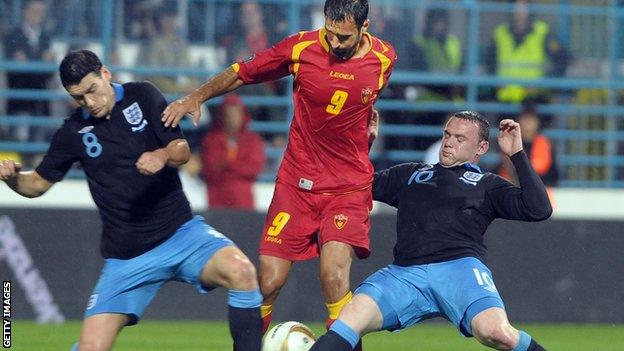Gareth Barry: FA looking into claims midfielder invested £800K in Swindon Town in 2013
- Published

Gareth Barry (left) won 53 caps for England
Claims former England midfielder Gareth Barry invested £800,000 into Swindon Town in 2013 are being looked into by the Football Association.
The allegations were revealed in a High Court judgement involving the League Two club's chairman, Lee Power, who said West Bromwich Albion's Barry provided the money.
Power also said Barry, who was at Manchester City at the time, did not own any shares but was "entitled to 50% of profits" from any increase in the club's value, and from certain player sales.
According to the judge, Barry said "categorically" he was not an investor and did not have an agreement with Power, but instead lent money to his agent, Michael Standing, to fund the acquisition of the club.
Under FA regulations, agents are not allowed to own clubs because of potential conflicts of interest.
Standing says he acquired 50% of Swindon's holding company, Swinton, for £800,000 when Power bought the Robins in 2013.
But the claims about Barry, 39, came after Standing successfully took out an injunction to block the sale of the club without his consent.
Power said a United States-based company called Able are willing to buy Swindon for £7.5m.
BBC Sport has contacted Barry for comment.
Judge Michael Green QC found in favour of Standing, but said: "Mr Power does not deny that there was another person involved in the acquisition but, extraordinarily, he says that it was not Mr Standing but his very good friend, the well-known England international footballer, Mr Gareth Barry.
"Mr Power disputes that Mr Standing and/or Mr Barry have a 50% interest in the club, but he does accept that Mr Barry has certain contractual rights.
"Mr Power says that there was a meeting in March 2013 at Mr Barry's house, attended by him and Mr Standing. At that meeting, Mr Power says he reached an oral agreement with Mr Barry in the following terms:
Mr Barry would be allowed to invest in the acquisition of the club and, to that end, Mr Barry, through a corporate vehicle, would provide the initial £800,000 required, with the same split of £300,000 for the shares and £500,000 as working capital.
Mr Barry would not own any shares in the club, whether directly or indirectly, but he would be entitled to 50% of the profits arising from any increase in value of the club, including 50% of net profits arising from sales of certain players.
Mr Barry and Mr Power would fund 50/50 any ongoing working capital requirements of the club. They would also have equal responsibility for discharging a debenture over the club's assets held by Mr Andrew Black, a former owner of the club, in the sum of £2m in the event of a sale of the club.
"The reason why there had to be confidentiality about the beneficial interest, if there was one, or the fact of Mr Standing's or Mr Barry's involvement, was because of the Football Association's rules concerning the ownership of football clubs.
"Mr Standing has an interest in a company called First Touch Professional Management Ltd (FTPM), which is involved in the football agency business. Its main client is Mr Barry. The FA's regulations are now contained in the FA Regulations on Working with Intermediaries and they prohibit football intermediaries/agents from owning or having interests in football clubs. Mr Barry remains as a professional footballer, currently playing for West Bromwich Albion FC, and he too was unable to hold shares in any football club."
In the judgement, it was claimed Barry lent the money to Standing because he was a "good friend" but has no rights or interests in the club.
The judgement continued: "[Barry] also said that, for the purpose of making it clear that Mr Power had no defence that Mr Barry was the investor, he would assign any alleged interest in the club or the joint venture by which Mr Power acquired the club, to Mr Standing for £1."